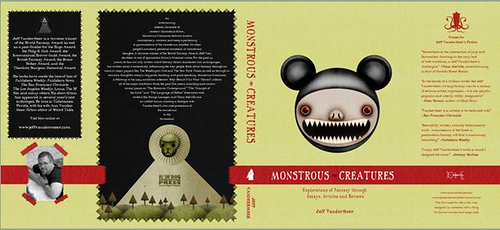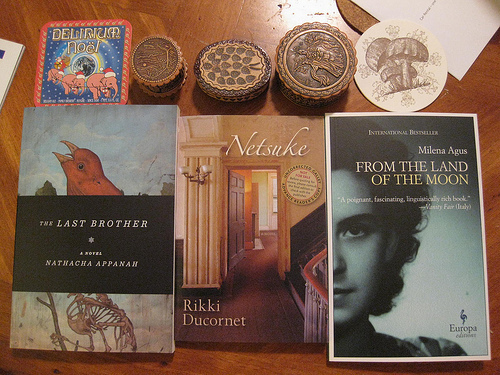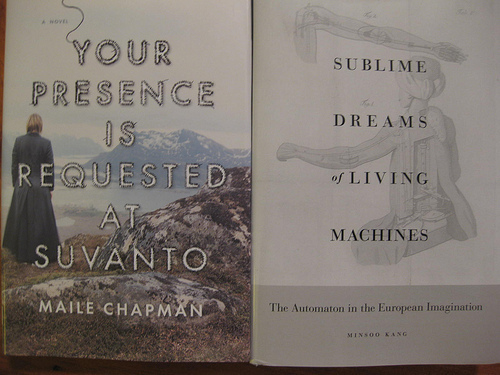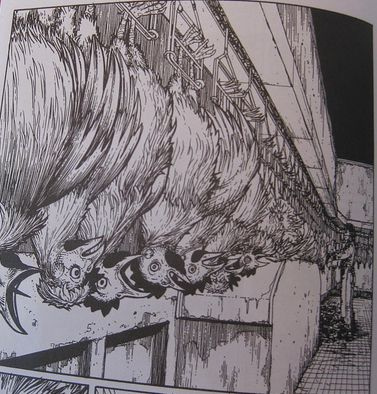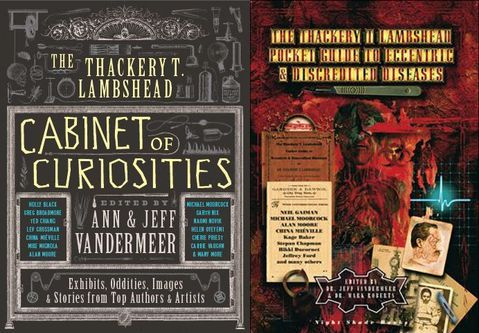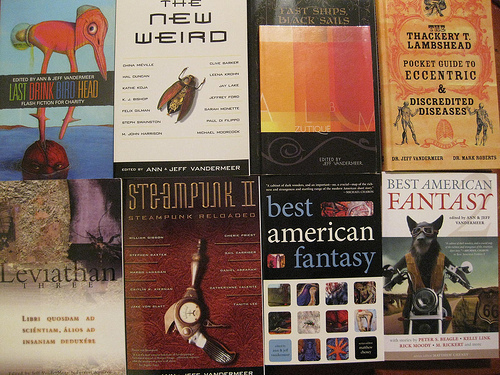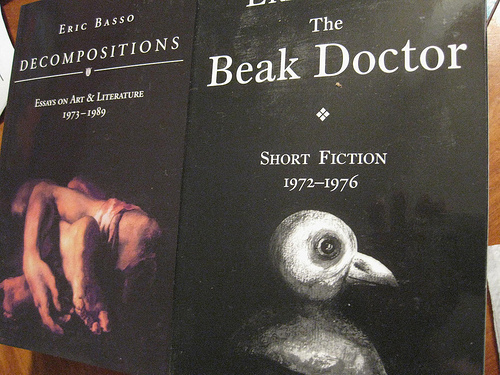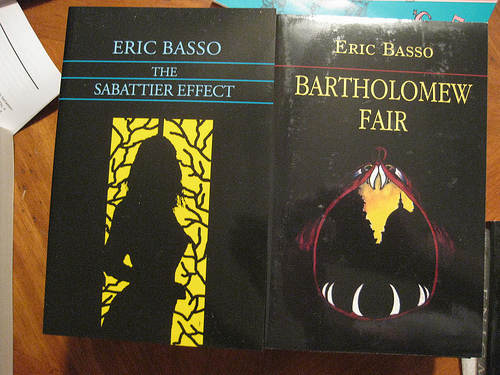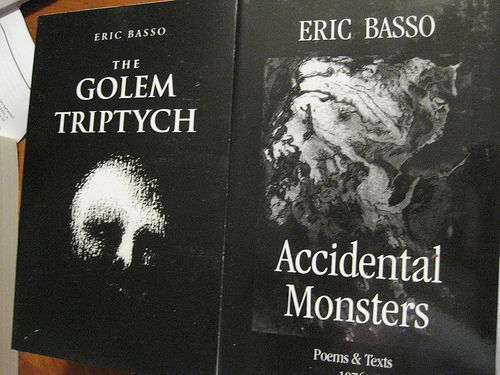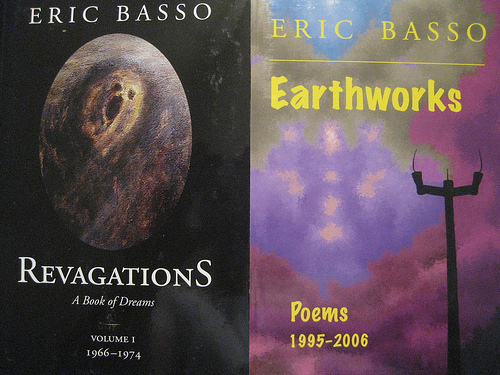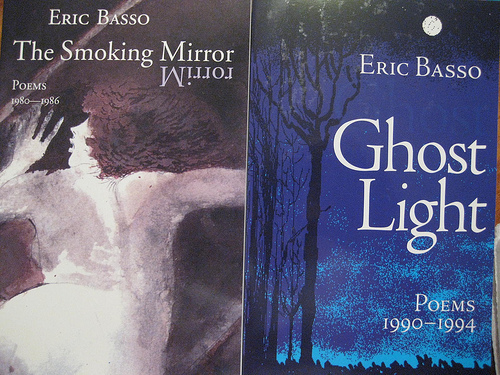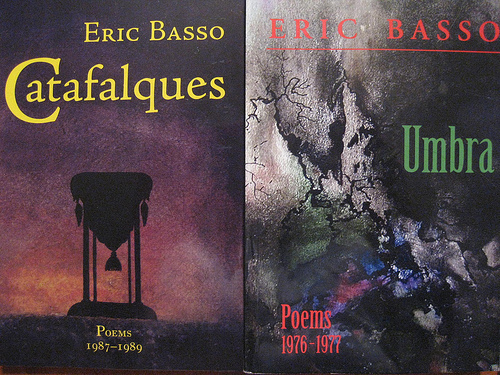Jeff VanderMeer's Blog, page 69
February 6, 2011
Locus Online–Update on International SF/Fantasy/Horror
Just a quick note that due to circumstances beyond my control I am behind in compiling the 2010 version of this list. Rest assured it's being worked on soon and information solicited shortly—including from those who commented on the list from countries not represented.
Further, please contact me with a brief paragraph of credentials if you live in a country not represented on last year's list or in the comments thread–and you are familiar with the genre scene there and willing provide a list for your country. I am following up on other contacts to expand the range of the list, but more never hurts. I cannot promise anything, but do email me at vanderworld at hotmail.com. I'd prefer you not comment here so I can keep proper track via email instead.
I'm working on making things more systematic and independent of my own schedule for the 2011 list. Thanks,
Locus Online–Update on International SF/Fantasy/Horror originally appeared on Ecstatic Days on February 6, 2011.




Monstrous Creatures Pre-Orders: Royalties Go to Translations (with Froggie and Cheese)

(Art and design Jeremy Zerfoss; slogan, Stepan Chapman; download a high res version here)
The long and the short of it: Raw Dog/Guide Dog is now offering not just the hardcover and trade paperback of my nonfiction collection Monstrous Creatures (see TOC) but a signed limited edition that includes the following additional section and a different cover. All royalties I receive these editions of Monstrous Creatures will help fund, along with direct donations, the translations component of the anthology Leviathan 5.
Bonus Section for Limited: "Monstrous Jobs" (in which I am forthcoming about odd jobs I have held)
—I'm Not With the CIA" (in which I am chased by a vicious dog)
—"Ms. Bookwarehouse" (in which I must do unnatural things in a bookstore)
—"The Baron's Son with Blackened Fishsticks" (in which I must write narsty things to Taco Bell)
—"Lord of the Flies with Middle Management" (in which many bad things happen)
—"How I Became Dr. Lambshead's Assistant" (in which I am chased by an idea)
—"The Pellet Story" (in which I am arrested for a time)
—"Pitch Me Eden" (in which freelancing becomes Biblical)
Free PDF download of my prior nonfic collection Why Should I Cut Your Throat?
Cover by Jeremy Zerfoss (higher res on his site):
One story that didn't make the cut because of space considerations below, along with a video of another story I only ever tell aloud and isn't work-related…
VIDEO
"HEY, FROGGIE!"
Back in 1998 or 1999–I've wiped the exact dates from my memory–I, along with two colleagues, was sent on a road trip across the state by my current employer. Our task? To document existing business rules/models at the county level for a state agency.
This road trip took place over 18 weeks–every other week we would fly, or more usually, drive, to another location in Florida, some of them more cosmopolitan than others. Driving was interesting. Once, we got into an accident. A few other times, my colleague the driver would see a desired location, like a Chinese restaurant, and decide, although three lanes over and only 15 feet from the entrance to the place, in heavy traffic, to just barrel over two lanes of screeching, honking traffic to get to said restaurant. I thought we were all going to die.
There was also the care-free episode in Chili's when I found vast quantities of what appeared to be tinsel in my grilled chicken and one of my colleagues found what at first appeared to be a shredded condom in his Caesar salad, but was later identified (thank goodness) as something at least a little more sanitary, made of plastic. Then, to return to our plastics theme, on the way to the airport, a plastic bag got caught in one of the wheels and I suddenly saw smoke rising–had no idea it was just a plastic bag burning from the friction–and thought the $*%&$#&!! car was on fire…
Throw in a hotel from hell in Sebring, Florida (thousands of mosquitos *inside*; moist, sweating, ectoplasmic walls; corridors on the second floor built with such low ceilings I had to stoop), the car accident we witnessed in St. Petersburg during which the one guy decided to beat the living daylights out of the other guy, and the 8th trip (to where? I can't even remember at this point…) where one colleague lost the crown on one of his teeth and the other got a 103 degree fever and, yes, it was what you might expect: an absolute laugh riot.
But the piece de resistance (and I'd long since given up putting up any resistance–if we'd had a 10th meeting out of town, monkeys could have flown out of my colleague's butt during the sessions and I wouldn't have even blinked) occurred on our Fort Myers trip/experience.
***
The hotel we were staying at had a computer room with a printer so rather than lug our printer down with us, I was going to use the hotel facilities. I went down there with my disk and the glass door to the room was shut and some huge, 450 lb (I kid you not) 6 foot 5 white guy with a shaved head and an earring was using it. All he needed was a bandana, a parrot, and a pegleg to be a pirate. So he comes out and as he passes me in the doorway I see he has shut down the computer and I'm going to have to reboot–which is not good. I've got a deadline. I don't have the time.
So I just kind of under my breath, looking at the screen, said, "No!"
The guy immediately turns around and says to me, "Are you cursing me? Are you cursing me?" His face is all red and his eyes are wild. I have no idea what he's talking about, but about the time I say "What are you talking about?" he has begun a little dialogue with himself that goes a little like this:
He1: You shouldn't take this kind of bullshit.
He2: I know–you don't have to take this.
He3: Yeah–who does he think he is.
He4: Show him what you can do, Stan.
Which is scarier than his anger, frankly. So I tell him of course I wasn't cursing him–that I just said "no" to the computer. He says a few more things to me and to himself and stalks off.
I sit down, a little out of sorts, and turn on the computer again and start figuring out how to print on their crappy equipment…when he comes back in again!!!!!!! This time the conversation goes something like this:
He (to himself): Show him what you can do, Stan.
Me: ????
He: I can show you your blood on the floor, you punk.
Me: Why? Why do you want to show me my blood on the floor? (a little panicked)
He: You want a piece of me? Because we can go right now. Right now. I'd like nothing better than to see your blood on the floor.
Me: I don't understand what you're talking about.
He (to himself): He thinks you're stupid. He thinks you're a freak.
Me: Are you okay?
He: So come on–are we going to go? Are we going to go…
…and then he totally freaks me out by saying this:
"FROGGY–ARE WE GOING TO GO? FROGGY–I WANT YOUR BLOOD".
Now I'm sensing something seriously weird–I mean, how the hell does he get the frog connection? How does he know I collect and write about frogs? He doesn't know me from Adam.
So I'm severely rattled now and I'm looking around for something to hit him with because he's balling up his fists. There's nothing but the printer, so I kind of put my hands on it, I guess thinking I'd rip it off the desk and throw it at him. He, predictably, says again, "I'll see your blood on the floor."
Meanwhile, I'm wondering if printing out the meeting minutes is really worth my life. So I say:
Me: Should we call in security and ask them what they think of this idea?
He: Are you the manager?
Me: No. I'm not the manager. I just think we should go out into the lobby and ask security what they think of your idea.
He: Do you own the hotel?
Me: NO! I don't own the hotel. But let's go out in the lobby and ask them about this. Get it sorted out.
He (to himself): He's just making fun of you. He's going to get you.
Me: I'm going to get up now and we can go out in the lobby.
He: I'm still going to see your blood on the floor.
And then he leaves. One of my colleagues comes down to help out and wonders why I've locked the computer room door. I quickly let her in and lock the door, still trying to print the minutes for the next meeting. I tell her the story and she doesn't believe me! She thinks I'm making it up! (Imagine that.) So, then the guy comes back again, but can't get in because the door is locked…so at least I'm believed now…but we see the guy talking to the hotel clerk in the lobby. Then he leaves.
Then the hotel clerk comes in and says that the guy told her that I kicked him out of the computer room and told him I was the manager and I would call security on him…We explained our side of the story–"He's crazy…"–and that was the end of it. We never saw him again…
Needless to say, we all went out that night and had a few stiff drinks…
So…you've read ALL of this free content. How about a donation for Leviathan 5? Hmmm? It'll make me dance on video…
Monstrous Creatures Pre-Orders: Royalties Go to Translations (with Froggie and Cheese) originally appeared on Ecstatic Days on February 6, 2011.
February 2, 2011
Five Unique Books: Ducornet, Agus, Appanah, Chapman, Kang
Five rather intriguing and unique books have entered the house the past few days, and I'd like to put some special emphasis on them. I haven't read them yet, but have sampled all of them.
Netsuke by Rikki Ducornet—One of our iconic surrealists, Ducornet has gone very dark this time, with a tale of a psychologist who "seduces both patients and strangers," in a feat of very deep characterization. A strange and unusual book.
by Rikki Ducornet—One of our iconic surrealists, Ducornet has gone very dark this time, with a tale of a psychologist who "seduces both patients and strangers," in a feat of very deep characterization. A strange and unusual book.
From the Land of the Moon by Milena Agus—Set in Sardinia, this is another treasure from Europa editions by the looks of it. A young woman reflecting on the life of her grandmother, telling a sweeping story that's charming and painful. A short novel but a grand scope.
by Milena Agus—Set in Sardinia, this is another treasure from Europa editions by the looks of it. A young woman reflecting on the life of her grandmother, telling a sweeping story that's charming and painful. A short novel but a grand scope.
The Last Brother: A Novel by Nathana Appanah—Set during World War II on Mauritius in the Indian Ocean, this novel, from a sampling, is both devastating and beautifully written. The book follows the life of nine-year-old Raj who is put in a prison camp and meets a Jewish refugee named David. The novel focuses on Raj's life in the camp and the two boys' attempts to escape.
by Nathana Appanah—Set during World War II on Mauritius in the Indian Ocean, this novel, from a sampling, is both devastating and beautifully written. The book follows the life of nine-year-old Raj who is put in a prison camp and meets a Jewish refugee named David. The novel focuses on Raj's life in the camp and the two boys' attempts to escape.
Sublime Dreams of Living Machines: The Automaton in the European Imagination by Minsoo Kang—A wonderful short story writer, Kang has turned his hand to nothing less than a history of automata that looks absolutely fascinating. There are chapters on Alexandria, Masahiro Mori, Vaucanson, Borelli, Kempelen, Capek, Metropolis, and more. (I'm honored that my "Dradin, In Love" is mentioned on page 46.)
by Minsoo Kang—A wonderful short story writer, Kang has turned his hand to nothing less than a history of automata that looks absolutely fascinating. There are chapters on Alexandria, Masahiro Mori, Vaucanson, Borelli, Kempelen, Capek, Metropolis, and more. (I'm honored that my "Dradin, In Love" is mentioned on page 46.)
Your Presence Is Requested at Suvanto: A Novel by Maile Chapman—I've read Chapman's short stories and they're brillliant, especially the one we reprinted in Best American Fantasy. This first novel made a Guardian list of best first novels while being criminally under-appreciated here. Junot Diaz says it best: "Maile Chapman is one of my favorite writers and in [her novel] she has given us an eerie gift…It is a superb hallucinatory piercing, an ominous dispatch from that Gothic frontier of the Female Body." The novel's set in a convalescent hospital in Finland and the writing, again from a sampling, is brilliant. Compared also to early McEwan and Highsmith.
by Maile Chapman—I've read Chapman's short stories and they're brillliant, especially the one we reprinted in Best American Fantasy. This first novel made a Guardian list of best first novels while being criminally under-appreciated here. Junot Diaz says it best: "Maile Chapman is one of my favorite writers and in [her novel] she has given us an eerie gift…It is a superb hallucinatory piercing, an ominous dispatch from that Gothic frontier of the Female Body." The novel's set in a convalescent hospital in Finland and the writing, again from a sampling, is brilliant. Compared also to early McEwan and Highsmith.
Like what you've read here? Consider donating to Leviathan 5.
Five Unique Books: Ducornet, Agus, Appanah, Chapman, Kang originally appeared on Ecstatic Days on February 2, 2011.
February 1, 2011
February Fund-Raising Challenge: Make Me Dance, Support Translated Fiction
Leviathan 5: The Next Wave, the latest in the award-winning fiction anthology series edited by my wife Ann and me, will focus on new writers of weird fantasy fiction, and will also endeavor to have an open reading period as world-wide as we can make it. This means many writers who don't write in English will be able to submit, to our brigade of foreign language editors. The publisher is ChiZine, and they're providing a budget that is respectable for an English-language anthology. BUT, we will need more funds for the translation component. READ HERE FOR MORE CONTEXT.
So…all of February is fund-drive month here at Ecstatic Days. Our goal is to raise $1,000 in 28 days, to add to the $300 in donations already received. Your name will be listed in the book, and you can donate easily through paypal to vanderworld at hotmail.com or via check to "Jeff VanderMeer", POB 4248, Tallahassee, FL 32315.
IF we reach the $1,000 goal, I will do an interpretative dance based on the title story in my story collection, "The Third Bear," which will be taped and put up on YouTube for your enjoyment. Trust me when I say that…I am a terrible dancer…and very bad at interpretative dance…and, um, a dance based on The Third Bear…I could do myself an injury on accident… (Note also that per this post, I can confirm that my collection Third Bear has earned out, which means my pledge to use all royalties received from the book toward Leviathan is no idle claim.)
In case you need proof of the potential entertainment value, here's a limited view of my prior skill at (1) acting and (2) moving around.
February Fund-Raising Challenge: Make Me Dance, Support Translated Fiction originally appeared on Ecstatic Days on February 1, 2011.
Three Bloggers Blogging: Gerry Alanguilan's Elmer

This is the fourth in a series of reviews done by myself, Larry Nolen, and Paul Smith. Each of us (along with the occasional guest reviewer) reads and reviews the book selected independently of the others' opinions. Larry and Paul's reviews may be found at the respective links above, along with a summary post on Amazon's book blog. Next up: the work of Eric Basso.
Gerry Alanguilan's Elmer, first published by Komikero in the Philippines, was finally picked up by SLG in North America last year. The four-book comic now collected as a graphic novel tells the story of a family of chickens and their interactions with human beings in the aftermath of chickens everywhere mysteriously becoming intelligent. Thankfully, Alanguilan doesn't waste time trying to explain why chickens have become intelligent. Instead, he employs a structure that follows chicken Jake Gallo's quest years later to understand his father, Elmer, and also to understand the horrors and mercies of the past. Elmer's left behind a diary, and Jake reads through it, Alanguilan using flashback sequences to devastating effect, their power in part due to the contrast with the scenes set in the relative normalcy of the present.
There are many moments of pathos in Elmer, scenes that will stick with me for a long time, but perhaps the one that got to me the most also explains why Elmer is so effective in presenting seriously and with great skill an idea that in summary seems destined for humor. Jake's sick mother, from her bed, recounts what those first moments of sentience were like: "It was as if someone turned on a light. Like waking up from a long sleep and you don't remember who you are, where you were…and what time or day it was. I couldn't really remember anything. Except that I was hungry. As if I was always hungry. I wanted to eat. It was a desire that seemed to completely consume me. Then the screaming began…"
This leads to one of the great page-turns in recent comics history, when she realizes she's in a poultry kill line.
This style used by Alanguilan is so important to Elmer. It is detailed but clean, never cluttered. It allows the text to support a realism in the art that makes the reader move past any doubt about the seriousness of the intent. This style also allows Alanguilan to give his chicken characters personality without reducing them to caricatures. The faces are expressive while still being specifically chicken-like. Some readers will want to read parallels to real-life bigotry and real-life events, and I think this is secondarily Alanguilan's purpose. But the primary challenge he faced was to tell a story about chickens that become intelligent, and it's from the foundation of making the reader believe in that story that any other effects are at all possible. In other words, Elmer can become metaphorical only after it's become real.
Elmer is also solidly about family. All the great art in the world wouldn't matter if Alanguilan didn't keep the spotlight firmly on this family of chickens and their bond to human allies. Son Jake is a good kid, the father is admirable if at times distant, the rest all have their quirks, their foibles, the things that make them distinctive. You genuinely care about these people, and you worry terribly about what they go through. A real depth of feeling comes through on the pages, a sense of the author knowing these characters very well. To accomplish this in the short span of a relatively slim graphic novel is nearly miraculous and speaks to the level of the creator's skill.
I have to admit that I teared up a few times reading and re-reading Elmer, something that almost never happens to me.
Note my prior post about the limited edition version of Elmer that the creator so kindly sent to me.
Three Bloggers Blogging: Gerry Alanguilan's Elmer originally appeared on Ecstatic Days on February 1, 2011.




Awards
It's pretty simple. If you list your work so readers can remember what you had out that's eligible in a given year, great. That's kind of a public service, and if many people are going to do it, then everyone should do it or it becomes a potentially unfair advantage. John Scalzi also provides a a blog post where you can comment to recommend things. That strikes me as helping those who don't have a strong blog presence make sure people remember. It's also important to study awards you're eligible for and make sure your publisher sends your work to any judging panels.
However, if you're on twitter or facebook urging people to vote for you, I'm deeply unsympathetic. If you're emailing people saying to vote for you, same thing. If you're asking people in person to vote for you, that's also not cool. If you're suggesting with a wink that you'll vote for something if they vote for you…not cool.
On the reader side…voting for things you haven't read…voting in categories where you've read like three things that year…voting because you think someone's cool…not cool.
This process will never be perfect, but let's not consciously make it worse than it can be. And if you cynically think that awards are just there to be manipulated so what's the harm…well, that does in fact make it worse.
The closest I could come to recommending my own work this year was a post about a book I had out and a free download, and giving that link to Cheryl Morgan—and even that made me feel uneasy. Anything else would've made me throw up a little in my mouth. It becomes more difficult with regard to anthologies because in that case we're advocates for a lot of other writers, but it still makes me queasy.
Maybe I'm just an old crank, but that's how I feel about it. Send your hate mail to: Get Off My Lawn, POB 1234, Sosueme, FL 54321.
Awards originally appeared on Ecstatic Days on February 1, 2011.
The Thackery T. Lambshead Cabinet of Curiosities…Revealed…
Yesterday io9 revealed the table of contents for The Thackery T. Lambshead Cabinet of Curiosities, our follow-up to The Thackery T. Lambshead Pocket Guide to Eccentric & Discredited Diseases. This new anthology is out from HarperCollins in June. Thanks to our editor there, Diana Gill, as well as Will Hinton, for making it a smooth and fun process. The book is available for preorder. It will be an oversized, 7 x 10 hardcover with probably special treatment of the front cover in terms of raised surfaces, etc.
A few extra notes about the anthology. It features over 70 images, including sumptuous title page treatments by John Coulthart. The book is divided into the following sections: Holy Devices and Infernal Duds: The Broadmore Exhibits, Honoring Lambshead: Stories Inspired by the Cabinet, Microbial Alchemy & Demented Machinery: The Mignola Exhibits, The Miéville Anomalies, Further Oddities, Visits & Departures, and A Brief Catalog of Additional Items. In addition, each section is prefaced by the continuation of a brief frame story I've written, and the "introduction" is a reveal of further details about Lambshead not set out in the first volume.
The purpose of all of this was to create contexts for different kinds of stories. So the book includes everything from traditional fantasy to avant garde approaches, as well as stories presented as exhibit descriptions. It's browsable or, because of the variety of the content, readable straight through.
I thought I'd set out the full list of contributors in alphabetical order, starting with the amazing artists. Most of the art is original to the anthology, including four new pieces each by Mike Mignola and Greg Broadmore. Jake von Slatt actually built two new pieces for the anthology. The plan is that readers will have a chance to win one of the pieces—not a photograph of it, the actual artifact.
ART BY:
Aeron Alfrey
Kristen Alvanson
Rikki Ducornet
Greg Broadmore
John Coulthart
Scott Eagle
Vladimir Gvozdariki
Yishan Li
China Mieville
Mike Mignola
Jonathan Nix
Eric Orchard
James A. Owen
Ron Pippin
J.K. Potter
Eric Schaller
Ivica Stevanovic
Jan Svankmajer
Sam Van Olffen
Myrtle von Damitz, III
Jake von Slatt
SHORT STORIES
Kelly Barnhill
Holly Black
S.J. Chambers
Stepan Chapman
Ted Chiang
Michael Cisco
Gio Clairval
Amal El-Mohtar
Minister Faust
Jeffrey Ford
Brian Evenson
Lev Grossman
Will Hindmarch
N.K. Jemisin
Caitlín R. Kiernan
Mur Lafferty
Jay Lake
China Miéville
Michael Moorcock
Alan Moore
Reza Negarestani
Garth Nix
Naomi Novik
Helen Oyeyemi
Cherie Priest
Ekaterina Sedia
Rachel Swirsky
Carrie Vaughn
Tad Williams
Charles Yu
MICRO FiCTIONS (A Brief Catalog of Additional Items)
Hugh Alter
Charlie Jane Anders,
Julie Andrews
Christopher Begley
Jayme Lynn Blaschke
Nickolas Brienza
Tucker Cummings
Kaolin Imago Fire
Jess Gulbranson
Jennifer Harwood-Smith
Willow Holser
Rhys Hughes
Incognitum
Paul Kirsch
Michael J. Larson
Therese Littleton
Graham Lowther
Claire Massey
Tony Mileman
Adam Mills
Annalee Newitz
Ignacio Sanz
Steven M. Schmidt
Grant Stone
Norman Taber
Brian Thill
Nick Tramdack
Nicholas Troy
Tom Underberg
Horia Ursu
William T. Vandemark
Kali Wallace
Tracie Welser
Amy Willats
Nadine Wilson
Ben Woodard
The Thackery T. Lambshead Cabinet of Curiosities…Revealed… originally appeared on Ecstatic Days on February 1, 2011.
January 31, 2011
Editing Fiction Anthologies (Part 1)
Although I am posting this entry to my blog, my wife, Ann VanderMeer, contributed significantly to the content and wording. See also the previous posts Anthologies: Comments, Anthologies from a Reader's POV, and Anthologies from a Writer's POV. – JeffV
Editing original anthologies in the twenty-first century has become much more than a process by which you put 10 to 25 stories between two slabs of pulped wood and glue it all together. I think you can chart the beginning of the changes from the 1970s, a time when, if you look at many of the anthologies being published, they didn't so much pitch readers on the names of authors as on themes or a series or editor's brand. But at some point, this wonderfully ego-less approach went away, and over time the creation of an anthology, especially at the commercial publisher level, became more name-driven, and thus a little more like a Hollywood pitch.
That said, acquiring a core of well-known/best-selling writers for your anthology project most definitely isn't "selling out"—those authors are in that position because they're professionals who have produced great fiction for either a general or strong niche audience for a number of years. They are known for bringing a particular style or approach, and a certain level of quality, to whatever they do. Invites to these writers should be based on genuine affection for and appreciation of their work, along with knowing they're right for a particular project.
However, this part of the process also shouldn't devolve into a reflexive seeking out of the same core group for each anthology. There is an impulse—quite normal and understandable—on the part of agents and editors to want the same handful of names as the Holy Grail for an anthology. In actual fact, though, those particular writers only contribute to a tiny percentage of anthologies each year—and Fantasy & Science Fiction is actually wide and deep enough for other names to have impact as well. (it's worth noting that Indie press anthologies are not immune from needing established writers, either—sometimes it is even more important given the vagaries of distribution and getting the word out.)
Within this paradigm, there should still be plenty of room for inviting less commercial writers and newer writers to participate in your anthology. Indeed, we would argue that as an editor you have a responsibility to the health not only of your anthology but of the SF/Fantasy community (or whatever genre you're working in) to encourage submissions from newer writers. It is becoming increasingly clear, too, that, a narrowness in reading tastes can be an active liability, given an increasingly omnivorous readership.
The advantage of experience does often result in greater consistency from an established writer. However, it is not true that established writers will automatically produce better work. One of the unfortunate byproducts of the otherwise often wonderful S/F subculture (or any subculture, really) is a fixation on personalities and types that sometimes obscures the actual work and supports an unspoken assumption that X, Y, and Z are "hot" and therefore more talented than A, B, and C. An editor's ability to at times ignore the shiny-shiny and the hype that lubricates the genre community is essential to producing quality anthologies.
As alluded to above, another important element is knowing what writers are best for which projects—and which aren't. Sometimes this means playing to a writer's perceived strengths. Sometimes it means having the insight to invite them to a project that seems counter-intuitive given their skill set or focus. Asking a writer to play against type requires careful research on the part of the editor, along with a kind of gut feeling based on experience that this is the right decision. The reward? Asking a writer to do something different from their usual approach can translate into a certain freshness in the writing of a story, and thus result in great fun for the reader.
At any given time, Ann and I have lists of upwards of 200 writers who might or might not be right for a given project. Sometimes it takes awhile to get to a project or point where we can invite a particular writer, for any number of reasons. Recently, a writer, somewhat against their own instincts, asked why they hadn't been invited to a project. Ironically, in another few months we indeed would have been inviting that writer to a project. In fact, when we have open reading periods, we often flag the names of writers who seem talented but whose work wasn't right for the particular anthology—and come back to them with encouragement when we do have a suitable project. Beginning writers in particular should recognize that submitting a story to editors who edit anthologies regularly is an audition that may pay off much later.
There truly are actually many more writers out there with the skills and talent to write for any given anthology than you can possibly use. This is one reason why seeing the same names again and again in anthologies sometimes strikes us as odd. Editors will always have favorites and favorite modes of writing, but it also behooves editors for their own self-improvement and continued learning to expand the scope of their reading and research on an ongoing basis. In our case, we are aided by doing projects jointly and having reading tastes that intersect but are also independent on one another. We are omnivorous, and read widely outside of core genre. We are also constantly in seek-and-explore mode. The point of this branching out and forward movement is to try to avoid stasis, for the health of our projects and our own personal edification and growth (which also impacts my writing favorably). You always have a blind spot, you always make mistakes, and we don't mean to pat ourselves on the back for something that is part of an organic inquisitiveness…but as an editor you can either make yourself less or more receptive to new things.
So in that context, we try hard to mix it up as much as possible. All things being equal, and an editor's reading being wide and deep, there is no real constraint today against producing anthologies that are various as to the experience level of the writer, the background of the writer, and the approach of the writer. This isn't about creating quotas of any kind, but about encouraging access to projects and using one's leverage to nurture as many interesting approaches as possible—which enriches not only whatever project you're working on now but projects in the future. (It's worth noting, too, that over the past five years there's been a huge uptick in the number of non-Anglo writers entering the field and finding an audience; it would be a little odd for that not to begin to influencing anthology table of contents.)
Factored into this equation is simply who best fits the project at hand, along with who is available and who is interested when contacted—elements that advocacy and outreach can help correct for if you find yourself getting a lot of "no thanks". Certainly, though, there are situations beyond your control or types of projects for which you may not be able to attract as much variety as you might wish—for example, for a reprint anthology, a limitation imposed by, for example, the composition of writers associated with a particular literary movement.
A pet peeve related to including diverse approaches is the artificial divide between "genre" and "mainstream" or "genre" and "literary," in part because it separates like from like, especially with so much fantasy published by non-genre imprints these days. But also because it can blind an editor to wonderful writers simply because they aren't part of the genre subculture. This blindness can result in less richness when inviting writers to an anthology. For reprint anthologies, it can also blind an editor to work published in translation from other countries, simply because a certain percentage of this material isn't published within genre and therefore isn't considered fantasy. Most of our anthologies have a subtext of healing this rift, of ignoring this barricade. There is an implicit desire, too, for writers who might otherwise rarely encounter one another's work to enter into communication with one another. We have seen the results of not just indirect influence in this context but also the wonderful aspects of direct dialog between creators.
Part of this process is to hardwire the idea of taking chances into your general mission statement. We've always been a fan of Angela Carter's statement that she always wanted her reach to exceed her grasp. We believe this is as important a concept to consider when editing anthologies as it is when writing fiction. You will fall on your face every once in awhile, but most of the time you'll get much farther, with more reward, than if you'd been less ambitious. We all only have so many books in us, and only so much time in which to create them. Given a finite life and finite resources, it seems commonsense to focus on that which is unique and/or more personal whenever possible.
The second part of this two-part blog entry will focus on The Thackery T. Lambshead Cabinet of Curiosities and post later this week.
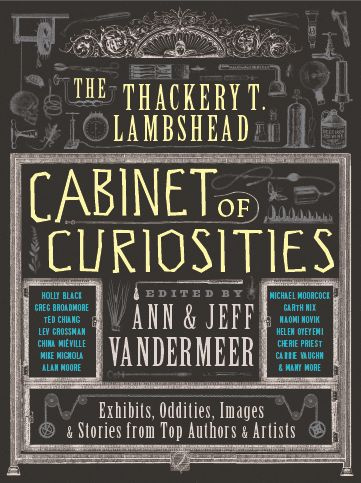
Editing Fiction Anthologies (Part 1) originally appeared on Ecstatic Days on January 31, 2011.
January 29, 2011
Negarestani and Pridham Go to the Movies: Deep Red by Argento
One thing I like about facebook is I have really smart friends who can take a sometimes superficial status message post by moi and turn it into a fascinating discussion. In such cases, you sometimes want to preserve it in a more formal context, like a blog.
Case in point, I posted this status recently about Argento's movie Deep Red: "The mansion scenes were very cool. Mise en scene very good. Climax not so hot. Lots of slow, weird scenes. Didn't understand the odd intermittent dubbing/subtitles/subtitles while actors dubbed Italian while speaking English. Several continuity errors too."
Reza Negarestani and Matthew Pridham then engaged in the short conversation reproduced below, and which I found fairly fascinating. I love the implication of a movie being haunted, perhaps intentionally, perhaps not.
Negarestani is the author of Cyclonopedia, one of my favorite weird texts of the past few years. Matthew Pridham wrote the great "Renovations," a Weird story from the point of view of a haunted house. (That story is available online here, and I highly recommend it—unfairly overlooked.)
This discussion contains spoilers.
Reza Negarestani: What I like about Argento's movies (aside from the glamorous 70s decor) is that, as you suggest, they are full of these weird dissonant scenes and plot holes from which I always get the impression that there should be at least one more plot brooding in the dark, that a story far more terrifying and convoluted than the actual story is behind the colorful superficial facade of his movies, something that seeps in and out on its own. And that the seamless surface is only there to dam the twists of this brooding plot which we never encounter in full.
Matthew Pridham: @Reza I completely agree with your experience of Argento's fragmented narratives! The dream-like nature of his movies create a sense that hidden connections and unseen plots abound. I can't watch "Suspiria", for instance, without thinking that young Suzy shares the nature of the denizens of the ballet school (trying to avoid spoiler language, here.) This is a quality of his Giallo noticeably absent from most other representatives of the genre, with the exception of the films of Lamberto Bava and Michele Soavi. If it is a matter of his plots truly just being messed up and projection on the part of certain viewers, what a fortunate fall!
@Jeff Coming from an Argento-phile, this sort of explanation may seem suspicious, but I would encourage a reading of his movies that allows those weird, sometimes seemingly purposeless scenes room to percolate. Some of the inconsistencies in his plots end up being my favorite aspects of them. Sometimes, on re-watching his movies, I have noticed even viewers somewhat hostile to the man pick up on resonances which begin to make sense. I think almost every one of his movies is best viewed as subtly supernatural or at least unnatural in the sense of a Kafka story… Carlo's death, I have always thought, is a weird sort of fate, one tied to how he has lived on the periphery of violence and catastrophe. He has been dragged into this situation from before he was even a teenager, and I find his "accident" to somehow make more sense than the usual "death by cop" a character such as he would have normally experienced in a "crime thriller." Also, some of Argento's strange casting and settings have nuances which go beyond the obvious. Carlo's "boyfriend", for instance, was actually played by an androgynous woman (a situation which is reversed in his "Tenebre") and this makes a weird sort of sense when you consider the reversal of gender expectations re. the real killer. Many people find the end sequence of his "Opera" to be similarly bizarre and inappropriate, but there is an almost obvious reading of the film that makes sense of it too. Maitland McDonagh's book "Broken Mirrors/Broken Minds" is a great introduction to this way of "reading" his movies.
And the unexplained, shall we say pseudo-natural aspects of Deep Red would certainly have to include the behavior of the puppet, the psychic reading at the beginning of the movie, the "accidental" deaths of both Carlo and the killer, and the barely mentioned "strange cries" which come from the old, abandoned house (the ghostly echoes of a child's scream, a child who wasn't even dead yet!)
Reza Negarestani: Matthew, excellent and fascinating commentary. This I guess calls for a new genre of narrative: Xenopoetics i.e. poetic unraveling of a work on the basis of an irrevocably alien (xeno) presence in the work. This alien presence can be just a… room number that camera focuses on a bit longer than usual, a sound whose source is not in the scene, a gun that is hidden in a drawer but is never used (anti-Chekhov gun), etc. I am sure Jeff also agrees that these alien-to-plot elements harbor an exciting aspect of the weird but I think the key is the careful and thought-through deployment of them.
As for Argento's plot holes, it also reminds me of another well-known director whose works—for unknown reasons—I have never paid enough attention to—David Lynch. Lynch's movies are full of plot holes but I haven't really got excited by them. Maybe it's because of the proportion of plot holes to the plot. Only the right proportion makes a story truly weird. It seems Lynch's movies are saturated by plot holes to an extreme extent that they relapse onto esoteric psychoanalytical narratives. In Argento's movies, however, the plot functions precisely like a dam, a superficial wall that brings these plot holes into focus rather than dissipating them into total chaos.
Matthew Pridham: @Reza Xenopoetics! I love it! A technique which certainly requires a delicate touch. I've tried some of this myself, and find that, particularly in written narratives, these details are often passed over too quickly to make the needed impact. This is an area where film may have an advantage over literature: a strange focus in a movie seems harder to disregard than in a text, possibly because people expect text to contain quite a bit of "superfluous detail." Have you read Robert Aickman? He is not for every taste, and some of his strange stories are too subtle even for a hardcore fan such as myself, but when he was at his best he could create a dizzying panorama of possible meanings with the most innocuous of additions to the plot. Your plot/dam metaphor is fascinating. This may be the difference between an "open text" and one which is, shall we say, "half-closed." Lynch certainly veers in the direction of the "wide open" and I can see where the resulting super-abundance of possibility can make his movies come off as too inward.
On the use of absence, or hidden presence, this xenopoetics, have you ever read about Salvador Dali's fascination with Millet's "Angelus"? His obsession with the erased image in that painting has given me a lot to think about in connection with this "hidden plot" mechanism. One of his recreations, "Archaeological Reminiscence of Millet's Angelus," gives me chills (and ideas) everytime I look at it
Negarestani and Pridham Go to the Movies: Deep Red by Argento originally appeared on Ecstatic Days on January 29, 2011.




January 28, 2011
Eric Basso's in the House
Over the next two or three months, I'll be reading most of these books by surrealist/gothic/weirdlit writer Eric Basso. Joining me in posting reviews will be Larry Nolen, Paul Charles Smith, and Matthew Pridham. If you want to read along, order some of them (we're especially focusing on the fiction, nonfiction, and plays), post about them, and I'll crosslink on the Amazon book blog.
Eric Basso's in the House originally appeared on Ecstatic Days on January 28, 2011.





